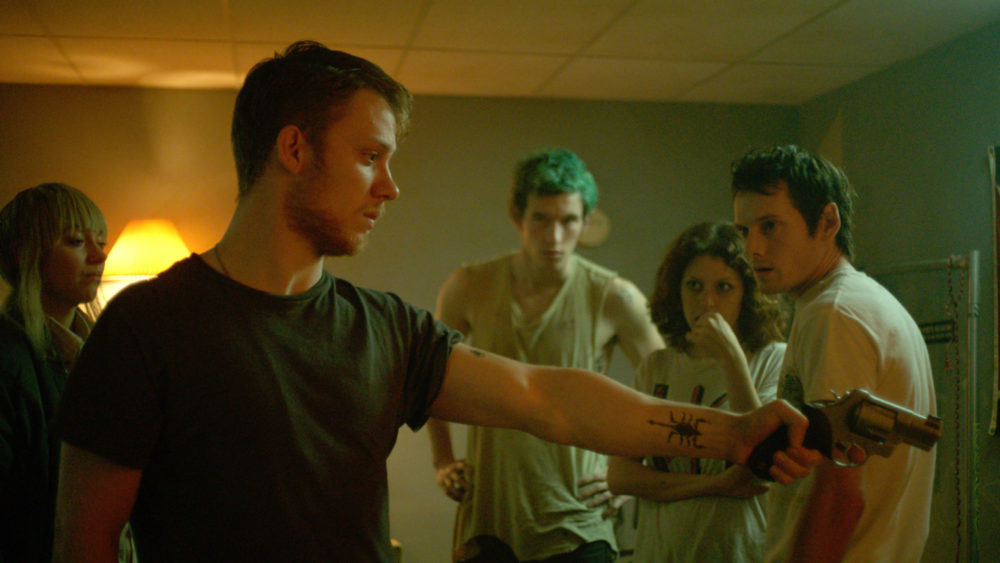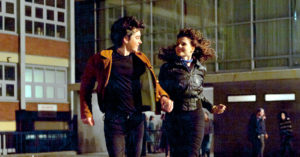
Jeremy Saulnier’s Blue Ruin was an interesting little movie, one that I found wonderful on a technical level but less so in terms of narrative and character progression. Green Room is, thankfully, a very different film. It’s a thriller with little interest in focusing on the dramatic elements that bogged Blue Ruin down in its latter half, and damned entertaining because of it.
As indebted to ‘70s thriller/horror flicks as Blue Ruin was to the Coen brothers, Green Room is the kind of movie that reminds us just how awful America can be when you’re a bunch of young adults on the road. Siphoning gas and barely making their way to tour stops, a four-man punk band (made up of Anton Yelchin, Alia Shawkat, Joe Cole and Callum Turner) ends up at a white supremacist bar (owned by Patrick Stewart and run by Macon Blair) in the Pacific Northwest to perform for some quick cash. When they end up witnessing a murder, everything goes to shit and the band has to figure out a way to stay alive with the help of another trapped individual, Amber (Imogen Poots), a friend of the victim.
It’s a quick and dirty plot that works as well as it needs to, creating the perfect atmosphere for a survival narrative. If there’s anything to take issue with in Green Room, it’s that Saulnier’s scripting doesn’t make his protagonists or villains as memorable as they should be, rendering certain bits of climatic dialogue a little less powerful than they should be. When they’re on screen, they’re wonderful though, and it’s an ensemble film through and through; a running joke about what every person’s “desert band” would be proves delightful (full disclosure: mine is Sade), among other silly things like Shawkat running around with a fire extinguisher and Yelchin and Poots in face paint. But the film barrels through character background and motivations and leaves certain things underdeveloped, all for the sake of delivering awesome set pieces.
This isn’t necessarily a bad thing, as the action and thrills are well-earned and sustained throughout the film’s duration. Saulnier and cinematographer Sean Porter make the most out of the bar location that most of the film takes place in, as well as the surrounding forest. As proven in Blue Ruin, this is a filmmaker who has a knack for making enclosed spaces feel larger than they are and finding every which way to work it to his protagonists advantage. As the characters have no clue what they’re doing—for instance, referring to gun cartridges as bullets and assuming that the barrel of one in a scene holds six instead of five—they have to rely on instinct and luck, the latter of which isn’t something they have an abundance of.
Working with spacial restrictions and focusing on a certain level of realism allows Saulnier to go wild with practical effects, the kind of stuff that makes an audience groan in disgust and cheer with utter glee when a baddie is slain. Guns blow heads off, box cutters slice folks open with delicious ease, and dogs rip necks to shreds. Best of all is that the film almost always knows exactly how long to dedicate a shot to a death, never holding too long that it veers into exploitation territory or too short to diminish the worth of a character or come across as mean-spirited.
Much of what drives Green Room is the menace of the unknown for unprepared individuals; a disembodied voice is a lot more terrifying than a seemingly harmless older dude with his back turned to you, especially when you’re trapped in a room. That, mixed with the sheer rush of adrenaline that a good film about survival offers, is exactly what makes it such a satisfying theatrical experience.
—
Directed by Jeremy Saulnier; written by Jeremy Saulnier; starring Anton Yelchin, Imogen Poots, Patrick Stewart, Macon Blair, Alia Shawkat, Joe Cole, Callum Turner, and Marc Webber; 94 minutes.
Green Room opens wide on April 29th, 2016.



 Derek
Derek
 Isabelle
Isabelle